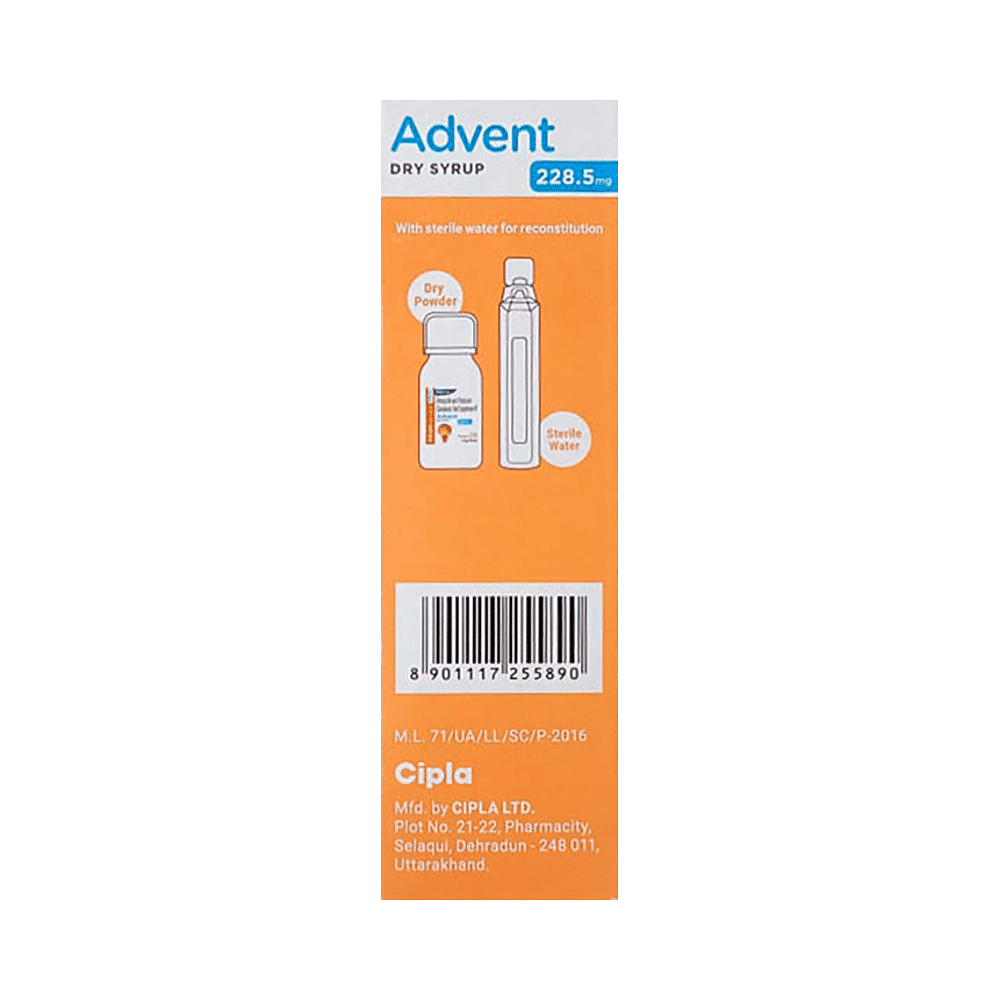
Espimox CV Dry Syrup
Manufacturer
Espirit Lifecare
Salt Composition
Amoxycillin (200mg/5ml) + Clavulanic Acid (28.5mg/5ml)
Key Information
Short Description
Espimox CV Dry Syrup is an antibiotic medicine that helps treat bacterial infections of the ear, nose, throat, chest, lungs, teeth, skin, and urinary tract.
Dosage Form
Dry Syrup
Introduction
Espimox CV Dry Syrup is an antibiotic medicine that helps treat bacterial infections of the ear, nose, throat, chest, lungs, teeth, skin, and urinary tract. It is capable of killing bacteria that have become resistant to other therapies and thus also helps treat tuberculosis that is resistant to other treatments.
Directions for Use
Your child must complete the entire course of antibiotics. Stopping too soon may cause the bacteria to multiply again or cause another infection.
Safety Information
Side Effects
No common side effects listed
How it works
Espimox CV Dry Syrup is an antibiotic. It has two active agents amoxycillin and clavulanic acid. Amoxycillin works by preventing the formation of the bacterial protective covering (cell wall) essential for the survival of the bacteria. Whereas clavulanic acid serves a special purpose of inhibiting an enzyme (beta-lactamase) that is produced by resistant bacteria. This makes the combination of amoxycillin and clavulanic acid an effective line of treatment for many types of infections.
Quick Tips
Your child must complete the entire course of antibiotics. Stopping too soon may cause the bacteria to multiply again or cause another infection. Your child may have a bitter taste in the mouth after the intake of Espimox CV Dry Syrup. Eating citrus fruit or sipping plenty of water or fruit juice may help. Encourage your child to drink plenty of water in case diarrhea develops as a side effect. Never give Espimox CV Dry Syrup until and unless prescribed by the doctor. Do not give Espimox CV Dry Syrup to treat common cold and flu-like symptoms caused by viruses. Never save medicine for future illnesses. Check ‘expiry’ before giving Espimox CV Dry Syrup to your child. Immediately discard all the expired medicines. Stop Espimox CV Dry Syrup immediately if your child develops an itchy rash, facial swelling, or breathing difficulty. Report to the doctor without any delay.
Related Medicines

Advent 228.5mg Dry Syrup Tangy Orange

Kramox CV Dry Syrup

Pelmox CV Dry Syrup

Ticmoxy BD Dry Syrup

Clanex Dry Syrup

Elmoclav Dry Syrup

Alonzaclav Dry Syrup

Moxidat CL Dry Syrup

Auxgo Dry Syrup

Sarimox-CV Dry Syrup
Frequently asked questions
Can other medicines be given at the same time as Espimox CV Dry Syrup?
It is important to inform your child's doctor about all medications they are taking before starting Espimox CV Dry Syrup. Additionally, checking with your child's healthcare provider for guidance on medication interactions and appropriate dosage is recommended.
Can I get my child vaccinated while on treatment with Espimox CV Dry Syrup?
Antibiotics generally do not interfere with the ingredients in vaccines or cause a negative reaction in children after receiving one. However, vaccinations are not recommended before recovery from any illness for which antibiotics are prescribed.
Which lab tests may my child undergo while taking Espimox CV Dry Syrup on a long-term basis?
Periodically monitoring kidney and liver function tests during long-term treatment can help ensure your child's well-being. This is conducted based on the physician's recommendation for each individual.
Can I give a higher than the recommended dose of Espimox CV Dry Syrup to my child?
Higher doses of this medicine can increase the likelihood of side effects. If your child experiences increased symptoms, it is crucial to reach out to their doctor for re-evaluation.
Can I stop giving Espimox CV Dry Syrup to my child when the symptoms are relieved?
It is not advisable to discontinue treatment without consulting your doctor. Continue administering this medication until the full course is completed, even if you observe improvements in symptoms. The medicine might still be offering benefits.
Can Espimox CV Dry Syrup cause diarrhea?
Yes, Espimox CV Dry Syrup may induce diarrhea due to its antibiotic nature. Additionally, the medication can disrupt the balance of bacteria in your child's digestive system, leading to diarrhea. If your child experiences this, encourage them to consume plenty of fluids and consult with a healthcare professional if diarrhea persists or signs of dehydration (reduced urination frequency, dark urine) develop.
Do all viral common colds result in secondary bacterial infection?
Viral infections usually do not lead to secondary bacterial infections. While antibiotics may be prescribed for some underlying conditions, they should only be used as directed by a doctor after assessing your child's needs.
The mucus coming out of my child’s nose is yellow-green. Is it a sign of a bacterial infection?
Yellow or green nasal discharge, while common during a cold, does not necessarily indicate a bacterial infection. It's normal for mucus to thicken and change color as the body fights off the viral infection.
Is there any sign which shows that my child needs immediate medical attention?
Seek immediate medical attention if your child experiences severe allergic reactions (difficulty breathing, skin rashes), gastrointestinal issues (severe diarrhea), and signs of liver damage (weakness, paleness, vomiting).


